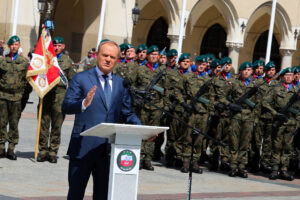If I say “Poland” — what do you think of? Marie Curie? Copernicus? Pierogi? All lovely in their own way, but not exactly cool. Now, however, everything is changing. From dank memes online to unintentionally patriotic rap songs, the country of Chopin is as trendy as it’s been since Solidarity. Yet if that’s doubtless happy news for the local tourist board, the rise of Poland as a cultural force matters far beyond filling hotel rooms in Gdańsk. Rather, it speaks to the country’s political and military maturity too, and perhaps also to a rising fascination with an alternative, if largely imagined, social model that Poland has come to embody right across the continent.
Poland’s cultural renaissance couldn’t have started under grimmer circumstances. Back in 2022, when war came to Ukraine, Warsaw quickly established itself as a key player in the broader Nato network. Yet amid the turmoil on Poland’s eastern border, and its robust support for Volodymyr Zelenskyy, the country’s broader image was shifting too. Already, it had successfully emerged from Eastern European obscurity and taken on various associations in the Western mind, from a bulwark of Catholic traditionalism to an alternative destination for American tourists who want to experience “Europe” without the crowds or Parisians.
Yet it’s online that Poland has truly found a new life in mainstream culture, where vodka-soaked stereotypes are falling away. Among some obscure circles, that’s been true for years: starting in the 2000s, Polish users on forums like 4chan pioneered memes like Polandball and Wojak, the “feels guy” that continues to dominate the internet today. Starting in 2007, meanwhile, The Witcher series of video games won the hearts of players everywhere, and was later adapted into a Netflix series.
Yet while these aspects of Poland’s digital patrimony have surely had a lasting impact among young online men, their broader reach was limited. No less important, their connection to Poland itself was often lost along the way: how many people watching Henry Cavill slay monsters really knew his character had been invented by a novelist from Łódź? In practice, that meant Poland long punched below its weight as a driver of internet culture, despite being Europe’s fifth most populous country, its sixth largest economy, and a leader in the use of digital services.
But as Poland’s political star soared, the country has secured a new and unlikely online audience: Gen Z. This odd-ball surge in enthusiasm was partly down to luck. It all started in November 2022, when an errant missile crashed in an eastern Polish field. After realising the incident was a mistake, rather than the precursor to a Russian invasion, the media quickly moved on. But, remarkably, the episode coincided with the release of Poland, a hit song by rapper Lil Yachty.
Whether due to the fortunate timing, or anyway thanks to the absurdism of a codeine-fueled hip hop anthem, the track went viral. Despite having little to do with Poland itself, meanwhile, the song’s music video, which currently has 33 million views on YouTube, also happens to feature Polish flags flying beneath the medieval walls of Kraków. Soon enough, Mateusz Morawiecki, the country’s then prime minister, had invited Lil Yachty to explore Poland for real. Last year, the rapper ended up performing the song six times at the Open’er Festival in the northern city of Gdynia.
This past summer, Poland found itself in the spotlight again, when notorious YouTuber and streamer IShowSpeed visited the country while on a transatlantic tour. He was impressed, declaring it “low-key the best country in Europe.” That was swiftly followed by Quavo, another rapper who posted a video of himself stopping in a Polish bakery. Amid the doughnuts and animal-shaped cookies, the clip garnered over two million views on Instagram.
Taken together, Poland had now come to the attention of Gen Z, whose memes mocking IShowSpeed run-ins with the intricacies of the Polish language have spread like wildfire. In contrast to Poland’s rather obscure online presence over previous years, these new bits of micro-culture have had tangible effects in the offline world: I soon found myself discussing Polish memes at actual parties with real people. I’m apparently not alone. Sales of a Polish bottled water brand, and accidental star of one famous meme, have apparently risen since IShowSpeed’s visit.
What stands out about the internet’s encounters with Poland over the last two years is a sense that netizens experience the country as it exists. That’s a change from the old historical cliches, of winged hussars and ugly apartment blocks, that have plagued its image for decades. Just as importantly, Poland is today seen as a standard-bearer for that “other” Europe, one online Americans are rarely exposed to. In internet narratives about Poland’s place in Europe and the world, Warsaw and Wrocław are increasingly lionised, in contrast to the over-saturated western side of the continent. Not unrelated, some recent online praise for Poland carries with it the whiff of nativism, with the country lauded for its safety, cleanliness, and supposed preservation of a “pure” and homogeneous European culture — an inaccurate stereotype that’s anyway been dampened by the defeat of the Right-wing Law and Justice Party in last year’s elections.
Yet the most enduring exhibit of Poland’s online influence aren’t fashy Instagram reels about Polish cities “free” of migrants, but rather an off-beat meme. As far back as 2012, Polish social media users started posting videos of themselves following beavers, usually at night, and exclaiming “Kurwa bóbr!” — which roughly translates to “Fuck, a beaver!” Despite an illustrious history in Polish online communities, the meme shot to wider fame in 2023, when a video of such an encounter gained 30 million views on TikTok.
While the phrases foreigners associate with Italy or France are friendly greetings, it’s been Poland’s destiny to become closely associated with a swear word. And though kurwa is used right across Central and Eastern Europe, it’s safe to say Poles have monopolised the term’s brand. As beaver memes spread across the internet, so too did the popularity of kurwa, which skyrocketed on both sides of the Atlantic from the end of last year.
The beaver meme phenomenon, and the associated use of kurwa, has become as intimately connected to Poland online, just as the faux pas of breaking spaghetti has to Italy and the supposed blandness of the food has to Britain. Underneath the meme’s absurdity lies an uncompromising honesty that’s unequivocally Polish, even as it hints, paradoxically, at the country’s newly robust presence on the geopolitical stage.
What all this means for Poland’s future cultural impact is unclear. But what’s indisputable is that as its voice becomes increasingly vital to European politics, the country’s online clout will only grow. And if its appeal at this phase remains quirky and irreverent, the power of the Polish brand will, I think, eventually translate to cultural heft on a par with that of its famous western neighbours. Offline, the stage has already been set for such a transformation. Polish cuisine, long enjoying a patronising reputation as comfort food, lately received official recognition when a local soup was named the second best on earth.
Alongside its famous tradition of video game development, Polish cinema has also been praised by Hollywood filmmakers, even as Poles have scooped up Nobel Prizes as recently as 2018. Of course, beaver memes may seem like a long way from such highbrow engines of the country’s soft power. But in our terminally online world, one sphere drives the other. Though Poles might cringe at the thought, then, a day is coming when kurwa bóbr is as widely understood as bonjour, danke and gracias.
Disclaimer
Some of the posts we share are controversial and we do not necessarily agree with them in the whole extend. Sometimes we agree with the content or part of it but we do not agree with the narration or language. Nevertheless we find them somehow interesting, valuable and/or informative or we share them, because we strongly believe in freedom of speech, free press and journalism. We strongly encourage you to have a critical approach to all the content, do your own research and analysis to build your own opinion.
We would be glad to have your feedback.
Source: UnHerd Read the original article here: https://unherd.com/



